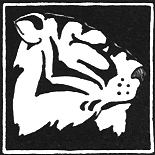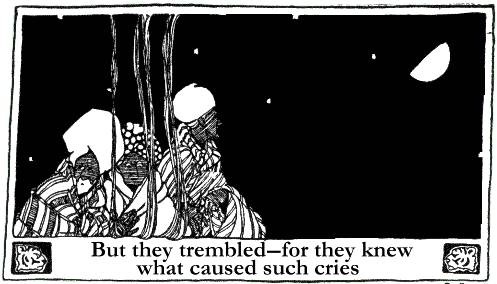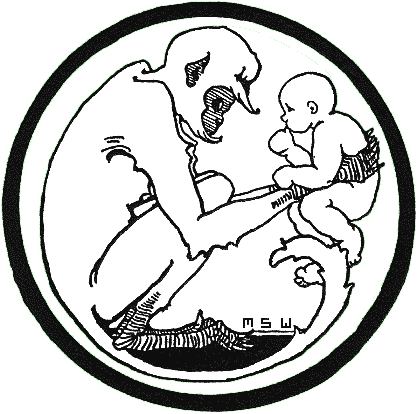 |  |
Wild at Heart Homepage | Contents | Previous Chapter
CHAPTER II
THE EDUCATION OF NANGA
1

Sixteen years ago a woman lay in the house, with a baby boy asleep in her arms, while a man dug in the garden outside--a stocky, thick-set man of the hills, naked save for his white calico cap and the red rag round his loins. He was still digging lustily when the swift December dusk came down, and, for all the chill of it, his body was streaming with sweat. He did not stop to note the sounds of a waking jungle or to mark how near and how dark the Ridge loomed above him. December days were short; and he had a child now to feed, as well as a woman.
Once only he paused. The apes up in the old banyan-tree, which he meant to fell because it took the life out of his soil and also housed the worst garden thieves in India, had suddenly ceased their evening brawl and scuffle. They were sitting as if frozen, staring down among the shadows and making that uneasy sound, half cough, half croak, that stands for their alarm. It was a monotonous chorus, and the man looked up angrily from his work, for he hated the apes. He shook his spade at them and shouted, “Silence, thieves!” and the woman lying in the dark heard the cry and smiled to herself.
Presently she got up and lit a fire of wood, and put a brass pot on it, busying herself about the house till the pot bubbled. Then she put her head out of the doorway and called a name.
There was no answer.
She called several times. But still there was no answer. So finally she went quickly to her baby, wrapped its blanket more closely round it, patted it, and went out.
Carefully--it was night now, and a half moon made the ground treacherous--she went forward, shivering in her thin sari, her bracelets and anklets clinking a little in the silence.
Now she had stopped. She was peering...There was something on the dark ground,--a heap of turned-up soil perhaps,--and, beyond that, something else that seemed to grow and dwindle, to steal in and out of the uncertain light, as if the whole night were acreep.
Then, as vision came suddenly, she realized what the two shapes were, and screamed. Scream after scream, hysterical, horrible with fear. The men squatting round the fires three miles away in Kotahbagh heard them, and huddled closer and trembled. But they trembled still more at the strangled half-cry that came last of all, the cry that was cut short. For they knew what caused such cries.

The apes in the tree kept up their croaking chorus all through that long night, peering anxiously at something stealthy on the ground. From time to time they were roused to a frenzy by sounds down there--shuffling sounds, tearing sounds--and just before the dawn they hopped on their boughs and stuttered in an agony of curiosity as to what the two things might be that were dragged, one after the other, over the furrows, through the stream, into the cane-brake beyond. But not one of them dared to go down to see; and in the morning the jungle had hidden one more of its million secrets. There was only a little blood on the upturned mold, that the sun would soon dry. A spade lay derelict; near it, a woman’s blue shawl, draggled and dusty; and, pathetically isolated from both, a little round calico cap.
All these things the apes noted shrewdly before they transferred their interest to the house. Then, characteristically, they forgot them. For the door of the house was open. Food lay within. And the house seemed empty.
They watched it, stealing a little nearer on their perches to gain a better view. Soon, their attitudes seemed to show, they would be creeping up to it on the ground; eyeing it, head on one side; peeping in. Already they were doing so in pantomime; but not yet in actuality--by no manner of means yet.
They were waiting for something. And presently a shiver ran down their ranks, showing patience rewarded. Out of the cane-brake beyond the stream a head protruded stealthily--a broad, ponderous head slashed in black and orange, with unwinking eyes, with a whiskered jowl, slobbering red. There was a moment’s quivering silence before the agitated chorus burst out anew.

Out of the cane-brake beyond the stream a head protruded stealthily
But the man-eater paid no heed to it. He drew himself out--there was something inordinately bestial in the slow emergence of that long body--and stooped to drink, snuffing luxuriously at the surface of the water, which came to him clear, but ran down from him crimson. For many minutes he browsed so. Then, to the accompaniment of feverish babel from above, slunk beneath the very shadow of the banyan-tree and away for the Ridge.
The babel lapsed into whimpers; then into silence. The dwellers in the tree were not vociferating now: they were listening instead; and not an ape of them moved until, far up the defile that covers a route to the Ridge, a peacock screamed--“Pa-oo! Pa-oo!”--and screamed again. Then they relaxed.
The pestilence had passed; something else had taken up the warning duty, and--with apes it is “out of sight, out of mind”--there were other things of interest besides tiger. They squatted again comfortably, eyeing the house. A bold three-year-old jumped on all fours to a lower branch and hung out at arm’s length, looking intently. Nothing happened. So he dropped to the ground and squatted there, another taking his place above. Soon there was a chain of them from the tree to within five yards of the doorway, each mimicking exactly the movements of his predecessor. But then, on the very threshold of achievement, a ludicrous thing happened. It was a stampede that surpassed any demonstration evoked by the tiger. Giant strides took them back to their citadel, and there was guilt in every bent grey back and lobbing tail.
Yet the cause was nothing more portentous than the thin wail of a hungry baby!
It was high afternoon before curiosity overcame fear, and the puckered black faces clustered over the thing that cried; before cold pads felt curiously, and restless eyes under shaggy brows inspected, the tiny brown body. And it was almost sunset-time before Nanga was whirled dizzily up among the rubbish in the old banyan-tree. He was past crying then. Without sustenance for nearly twenty-four hours, and thus snatched out into the chill evening, he would certainly have died even before his discoverers had tired of him and dropped him, but for one circumstance. There was a scuffle for him on arrival among the branches, and it was a mother who chanced to win him.
To preserve her prize, she put him in the hollow of her chest, folded her arms across him, and turned her back on the jealous horde. When she had bitten through a hand that reached tentatively for him from above and had despatched a young male in squealing flight, she looked down at the bidding of a familiar sensation: the little lips had found milk.
So it was that the miracle, the millionth chance recognized by science but so seldom seen, came actually to pass. Thereafter she fought for Nanga till her soft grey coat ran red.
2
The monkey tribe (it is a commonplace) get used to anything. Within a week, thanks greatly to a mother instinct backed by white teeth, Nanga was one of themselves; and, if in color he bore a lamentable likeness to their distant cousins, the common brown monkeys of the plains, and to their still more distant cousins, men, in shape at any rate he sufficiently resembled the dozen other skinny morsels that sheltered in the long white under fur of the various mothers of the troop. Soon he grew as active as they, performing the same acrobatic feats on the limited playground of a soft belly; dinging precariously, head down, while his foster-mother swung from branch to branch;

She would regard him a little curiously
climbing up under her chin while she sat at rest; peeping from between her arms at the wonderful world. Sometimes she would regard him a little curiously, because he was smooth and grew more quickly than the others, as if to say, “What strange thing is this that I shelter and feed?” She would hold him out then, and inspect him at arm’s length, askance. But of his own accord he would wriggle back, and all doubts would be resolved in the one sensation that was unmistakable. Reassured, she would croon to him, as mother apes do, and rock him to sleep.
As the days grew into months, she became inured to surprise; proud too, even indulgent, because he clung to her and knew her from the others. She it was who heard in a strange perplexity the tentative sounds by which all babies strive to express the great things that they mean. But she never understood them; and, for want of that understanding, the vocabulary stopped still where it had begun. So from first to last there was never any direct exchange of thought with that grey mother, who represented to him the only companionship bordering on the human. Communication was through sensation only, and it amounted to this--that, after the way of a child, in moments of want and of fear he would turn to her; and in moments of well-being, ignore her. And when one day he came upon her, lying inert at the foot of the old tree, and could not make her respond to his want, he touched the stiff fur and stroked the dead face in a perplexity that harbored nothing of sorrow. The next day she had disappeared, and he had forgotten her. She had lived just long enough to teach him to fend for himself.
Thenceforward he ran with the troop, climbed with them, foraged with them, and, as the long scars on his chest bore witness, fought with them, tooth and nail. Their faculties, up to a point, he developed--the agility, the keen sight and hearing, the extraordinary sense of smell. He could smell anger or fear or affection in one of them as surely as can dogs after their kind. He could distinguish, too, the peculiar smells of other species, the reek of the flesh-eaters, the queer tang of a snake, the sweet fragrance of deer; imitate their cries too,--rasp like a panther, bell like a stag,--and call them up in the fighting, mating times for the fun of sitting in a tree and watching their perplexity. But there his truck with the other species ended. He belonged to the apes, if he belonged anywhere; yet not wholly even to them.
They did not always perch in the banyan-tree. They would hunt up the big ravine under the Ridge, where the river ran; cross by a complicated suspension bridge of boughs, and descend at night on the fields and gardens of Kotahbagh--Nanga among them. Dawn would reveal shattered fruit-trees and trampled corn, but seldom any other sign of the thieves. Yet it was thus that Nanga was aware of the sound and the sight and the smell of man--sensations strange and bewildering, but on the whole unwelcome, since man as he knew him stood for exploding muzzle-loaders at close range. It was an experience of this kind, accompanied with a flash of red lightning in the night and sharp pain in the legs, that taught him to remain on the fringe of these marauding expeditions and let the bolder spirits play hide-and-seek with muzzle-loaders; and, so far from connecting man in any way with himself, he feared and detested him, with the result that, since his parents had bent over him in babyhood, no man had set eyes on him.
This may appear surprising. But there were many living creatures within the shadow of the Ridge that no man had set eyes on--creatures bulkier than Nanga. There was a serow, for instance, as big and as ugly as a donkey, living in a brake of ringal bamboo not a mile from the village; there was a sloth-bear; there was a whole dainty family of four-horned antelope. And, after all, what man living had ever actually seen the most prominent figure of all--the tiger of the Ridge? There was nothing really remarkable in the inconspicuousness of Nanga, who lived his days in a place shunned of man and left it only by stealth.
3
As the years went by, he had queer fits at times; and they came without warning. His face would cloud over, taking on a pensiveness like that of a man trying vainly to remember something--a vague, formless discontent, poignant in its futility. Perhaps he was dimly conscious of the insipidity of his company; perhaps his manhood was coming to him in the guise of these strange moods; at any rate, whatever the cause, the effect was always the same: he went aloof. He hid. And his invariable hiding-place was the ruin, which he regarded as his own. Once inside, he would remain there by the hour, greatly tantalizing the curious. But for some reason he was never disturbed there. His sanctuary was respected, possibly because of the bared teeth and the red rage in his eyes, warning intruders, and not an ape ever saw what he did inside.
The house was an empty shell--four mildewed walls inclosing the heap of rubble and sticks and straw that had once been its roof. Window and doorway were choked with weeds, and such light as entered filtered through gaps in the convolvulus that grew like a thick thatch over the skeleton rafters. Still, there was light enough; and, had an ape brother peeped in at the right moment, he would have had the reward of his boldness. He would have seen Nanga scrabbling with his nails in the rubbish; looking round furtively ever and again, then scrabbling with renewed ardour, till at length something would be unearthed, which he would clutch tightly as if it were alive. Slowly, fearfully then he would open his fingers ever so little to peep at his find, and thus a ray of light would catch the thing and it would flash. Then Nanga would hurriedly clamp his fingers over it and bury it again. All this anxiously, with all the pomp and circumstance, all the absurd caution, of a monkey introduced to a glass marble.
There was a deserted porcupine’s hole in the rubbish, and this was Nanga’s cache. It contained a number of objects, all such as would catch the eye. There was a copper ring, for instance, and a glass bangle. There was a cheap silver pendant, with cornelians clustering like little red seeds in a pod, which he had found among the green fronds of the cane-brake beyond the stream--the very cane-brake whence the tiger had emerged in a cold dawn sixteen years before, though that he could not know. Other things too: a little brass pot, such as every Hindu carries; the mounting of a pipe-bowl, with some shreds of black wood still protruding from the socket; and a coin. These he had grubbed out from the rubbish inside.
He liked them because they were bright. He was cautious in his handling of them, because he was quite certain that they shared the life of other bright things that were familiar to him--beetles, for instance, and butterflies. Indeed, these too figured in the cache. Their bruised wings, bronze and green and blue, lay all about. But, whatever other rudimentary notions he may have had about his hoard, certain it is that it signified this to him: property. Crouching thus in his corner, unearthing and peeping and burying again with his quick fingers, he was intensely possessive. He might have made a study for a picture of some miserly ascetic, gloating over gold.
This hour, almost of ritual, was his sole concession to the dim humanity in him. It was the hour set apart from the daily round of a shared life, the hour when he belonged not to apes, but to himself. Yet, even so, it was not an entirely happy hour. He was lonely; and however full of life his treasures might seem to be, they could not speak.